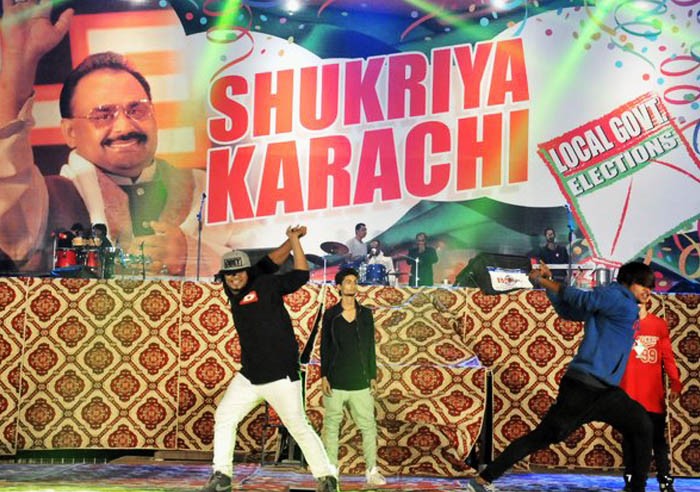
In last week’s local government elections, the win of the MQM in Urdu-speaking areas and of the PTI-JI alliance in Pushtun-dominated areas proves that politics in Karachi is divided on ethnic lines

Amid minor incidents of violence and mismanagement in the much-hyped local government polls held on December 5, the Muttahida Qaumi Movement (MQM) remained unchallenged, trouncing the electoral alliance of the Pakistan Tehreek-e-Insaf (PTI) and the Jamaat-e-Islami (JI).
Unofficial results from the Election Commission of Pakistan suggest that the MQM has secured simple majority by winning more than 105 out of total 209 constituencies, placing the party in a position to grab the mayor’s slot. Unofficial results show that the Pakistan Muslim League-Nawaz (PML-N) and the Pakistan People’s Party (PPP) have emerged second and third largest political parties in local government polls. However, the results of some seats are yet to be declared.
The PTI and JI have won nine and seven seats respectively from Pashtun and affluent parts of the city. In constituencies falling in the MQM influenced Urdu-speaking majority areas, where the PTI and JI contested polls together, the parties did not bag significant number of seats.
The MQM candidates defeated the Karachi chief of the PTI and JI, Ali Zaidi and Hafiz Naeemur Rehman for the post of union council chairman in Karachi’s Soldier Bazaar and North Nazimabad neighbourhoods respectively.
But, the PTI-JI joint candidate defeated the PPP Karachi president Najmi Alam in Clifton.
The Awami National Party (ANP), which won two Sindh assembly seats from Karachi in the 2008 general polls, has only been able to win one seat.
Interestingly, the Pakistan Rah-e-Haq Party (PHRP), an affiliate of the banned Ahl-e-Sunnat Wal Jammat (ASWJ) has emerged a key political party by winning two slots of chairpersons in district Malir, after forging alliances with the JI and PML-N. The PHRP’s emergence badly affected the Jamait-e-Ulema-e-Islam-Fazl (JUI-F), which only won two seats in the city.
Pakistan Muslim League Sher-e-Bengal, a political party representing Bengali community living in the city, has also clinched one seat from Machar Colony, a Bengali-majority neighbourhood. Twelve independent candidates from different areas have also won the polls.
Apart from Karachi’s urban areas, falling under the Karachi Municipal Corporation, the PPP has won the polls in the District Council Karachi -- a separate local body for the city’s rural and coastal areas which was revived by the PPP government in March this year. Out of its 38 UCs, the PPP won seats in 20, defeating Awami Ittehad, an electoral alliance consisting of local politicians and social activists, headed by Jam Bijar, head of Jhokio clan and Abdul Hakeem Baloch, State Minister for Communication.
Some analysts thought that the ongoing-targeted operation could affect the results of the local government polls in the city. However, their concerns proved wrong and the operation, for the first time, allowed all political parties to freely carry out their electoral activities across the city. Even, the MQM-Haqiqi, a rival faction of the MQM, was found active in their past strongholds such as Landhi, Lines Area and Malir.
Political analysts believe the results prove that the MQM has still a large support base in the majority of Urdu-speaking population, strong organisational support, and a strong track record of winning the polls by great margins since 1988.
Leaders of the PTI and JI tried to justify the formation of the electoral alliance by stating the PTI has a popular vote bank and the JI has good presence in the MQM-dominated pockets -- "The PTI does have mass support, but it lacks an organisational structure at grassroots level like the MQM and JI," said Firdous Shamim Naqvi to The News on Sunday before polls.
Despite such claims, the alliance performed badly in the local government polls. "The JI’s traditional voters came out to vote for the alliance but we did not see the supporters of the PTI on the polling day," says Naimat Khan, a journalist based in Karachi.
Muhammad Nafees, a Karachi-based political analyst, says current results show the MQM has a secure vote bank in the city. "Also, the polls show the politics in the city is divided on ethnic and nationalistic lines".
Unlike in the past elections in Karachi, the MQM did not field candidates in many union committees for the local government polls. It focused only on Mohajir-populated neighbourhoods. Although the MQM insists it is part of the party’s strategy not to field its candidates in ‘sensitive’ areas, analysts believe that the ongoing crackdown on criminals by the law enforcement agencies and the formation of the PTI-JI alliance had compelled it to focus on its traditional support base -- the Mohajir neighbourhoods -- instead of fielding candidates in areas populated by other ethnicities, like Pashtuns, Baloch, and Sindhis.
Discussing the MQM’s dominance in Karachi, another political observer says there is a non-MQM vote bank in Karachi but it is very fragmented. "It was clear that the MQM will win most of the seats while the PTI-JI alliance will clinch around 25 to 30 seats from the non-MQM influenced areas, mostly Pashtun areas," he says. "Various political parties contested polls in these areas, causing split in the non-MQM votes and stopped the alliance to win seats from there easily".
After the polls, a debate on powers of the mayor has started. The MQM has already termed the local government system ‘handicapped’, and the mayor of the mega city ‘powerless’. "The Sindh Local Government Act 2013 leaves Karachi’s mayor so weak that he cannot even order a cleanliness drive in the city," says Haider Abbas Rizvi, an MQM leader.